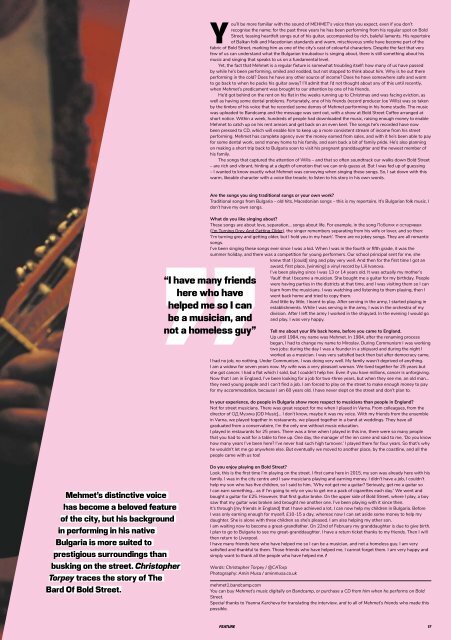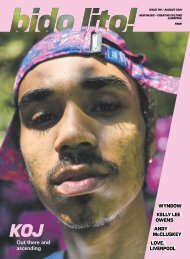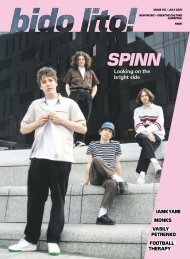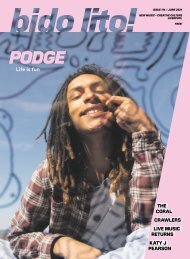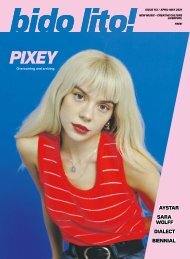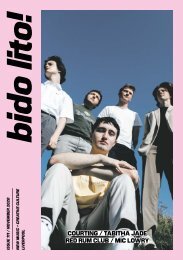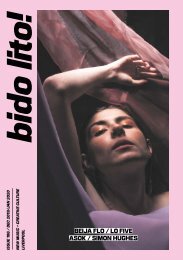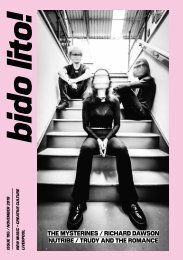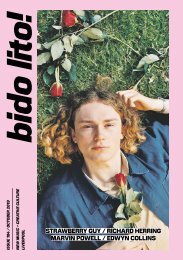Issue 85 / February 2018
February 2018 issue of Bido Lito! magazine. Featuring: RONGORONGO, MEHMET, NADINE SHAH, HOOKWORMS, WILLIAMSON ART GALLERY, DUDS and much more.
February 2018 issue of Bido Lito! magazine. Featuring: RONGORONGO, MEHMET, NADINE SHAH, HOOKWORMS, WILLIAMSON ART GALLERY, DUDS and much more.
Create successful ePaper yourself
Turn your PDF publications into a flip-book with our unique Google optimized e-Paper software.
You’ll be more familiar with the sound of MEHMET’s voice than you expect, even if you don’t<br />
recognise the name; for the past three years he has been performing from his regular spot on Bold<br />
Street, teasing heartfelt songs out of his guitar, accompanied by rich, baleful laments. His repertoire<br />
of Balkan folk and Macedonian standards and warm, mischievous smile have become part of the<br />
fabric of Bold Street, marking him as one of the city’s cast of colourful characters. Despite the fact that very<br />
few of us can understand what the Bulgarian troubadour is singing about, there is still something about his<br />
music and singing that speaks to us on a fundamental level.<br />
Yet, the fact that Mehmet is a regular fixture is somewhat troubling itself: how many of us have passed<br />
by while he’s been performing, smiled and nodded, but not stopped to think about him. Why is he out there<br />
performing in the cold? Does he have any other source of income? Does he have somewhere safe and warm<br />
to go back to when he packs his guitar away? I’ll admit that I’d not thought about any of this until recently,<br />
when Mehmet’s predicament was brought to our attention by one of his friends.<br />
He’d got behind on the rent on his flat in the weeks running up to Christmas and was facing eviction, as<br />
well as having some dental problems. Fortunately, one of his friends (record producer Joe Wills) was so taken<br />
by the timbre of his voice that he recorded some demos of Mehmet performing in his home studio. The music<br />
was uploaded to Bandcamp and the message was sent out, with a show at Bold Street Coffee arranged at<br />
short notice. Within a week, hundreds of people had downloaded the music, raising enough money to enable<br />
Mehmet to catch up on his rent arrears and get back on an even keel. The songs he’s recorded have now<br />
been pressed to CD, which will enable him to keep up a more consistent stream of income from his street<br />
performing. Mehmet has complete agency over the money earned from sales, and with it he’s been able to pay<br />
for some dental work, send money home to his family, and earn back a bit of family pride. He’s also planning<br />
on making a short trip back to Bulgaria soon to visit his pregnant granddaughter and the newest member of<br />
his family.<br />
The songs that captured the attention of Wills – and that so often soundtrack our walks down Bold Street<br />
– are rich and vibrant, hinting at a depth of emotion that we can only guess at. But I was fed up of guessing<br />
– I wanted to know exactly what Mehmet was conveying when singing these songs. So, I sat down with this<br />
warm, likeable character with a voice like treacle, to listen to his story in his own words.<br />
Are the songs you sing traditional songs or your own work?<br />
Traditional songs from Bulgaria – old hits, Macedonian songs – this is my repertoire. It’s Bulgarian folk music. I<br />
don’t have my own songs.<br />
What do you like singing about?<br />
These songs are about love, separation… songs about life. For example, in the song Побелях и остарявам<br />
(I’m Turning Grey And Getting Older), the singer remembers separating from his wife or lover, and so then:<br />
‘I’m turning grey and getting older, but I hold you in my heart’. There are no jokey songs. They are all romantic<br />
songs.<br />
I’ve been singing these songs ever since I was a kid. When I was in the fourth or fifth grade, it was the<br />
summer holiday, and there was a competition for young performers. Our school principal sent for me, she<br />
knew that I [could] sing and play very well. And then for the first time I got an<br />
award, first place, [winning] a vinyl record by Lili Ivanova.<br />
I’ve been playing since I was 13 or 14 years old. It was actually my mother’s<br />
“I have many friends<br />
here who have<br />
helped me so I can<br />
be a musician, and<br />
not a homeless guy”<br />
‘fault’ that I became a musician. She bought me a guitar for my birthday. People<br />
were having parties in the districts at that time, and I was visiting them so I can<br />
learn from the musicians. I was watching and listening to them playing, then I<br />
went back home and tried to copy them.<br />
And little by little, I learnt to play. After serving in the army, I started playing in<br />
establishments. While I was serving in the army, I was in the orchestra of my<br />
division. After I left the army I worked in the shipyard. In the evening I would go<br />
and play. I was very happy.<br />
Tell me about your life back home, before you came to England.<br />
Up until 1984, my name was Mehmet. In 1984, after the renaming process<br />
began, I had to change my name to Miroslav. During Communism I was working<br />
two jobs: during the day I was a founder in a shipyard and during the night I<br />
worked as a musician. I was very satisfied back then but after democracy came,<br />
I had no job, no nothing. Under Communism, I was doing very well. My family wasn’t deprived of anything.<br />
I am a widow for seven years now. My wife was a very pleasant woman. We lived together for 25 years but<br />
she got cancer. I had a flat which I sold, but I couldn’t help her. Even if you have millions, cancer is unforgiving.<br />
Now that I am in England, I’ve been looking for a job for two-three years, but when they see me, an old man…<br />
they need young people and I can’t find a job. I am forced to play on the street to make enough money to pay<br />
for my accommodation, because I am 60 years old. I have never slept on the street and don’t plan to.<br />
In your experience, do people in Bulgaria show more respect to musicians than people in England?<br />
Not for street musicians. There was great respect for me when I played in Varna. From colleagues, from the<br />
director of ОД Музика [OD Music]… I don’t know, maybe it was my voice. With my friends from the ensemble<br />
in Varna, we played together in restaurants, we played together in a band at weddings. They have all<br />
graduated from a conservatoire, I’m the only one without music education.<br />
I played in restaurants for 25 years. There was a time when I played in this inn, there were so many people<br />
that you had to wait for a table to free up. One day, the manager of the inn came and said to me, ‘Do you know<br />
how many years I’ve been here? I’ve never had such high turnover.’ I played there for four years. So that’s why<br />
he wouldn’t let me go anywhere else. But eventually we moved to another place, by the coastline, and all the<br />
people came with us too!<br />
Mehmet’s distinctive voice<br />
has become a beloved feature<br />
of the city, but his background<br />
in performing in his native<br />
Bulgaria is more suited to<br />
prestigious surroundings than<br />
busking on the street. Christopher<br />
Torpey traces the story of The<br />
Bard Of Bold Street.<br />
Do you enjoy playing on Bold Street?<br />
Look, this is the first time I’m playing on the street. I first came here in 2015, my son was already here with his<br />
family. I was in the city centre and I saw musicians playing and earning money. I didn’t have a job, I couldn’t<br />
help my son who has five children, so I said to him, ‘Why not get me a guitar? Seriously, get me a guitar so<br />
I can earn something… as if I’m going to rely on you to get me a pack of cigarettes each day.’ We went and<br />
bought a guitar for £25. However, that first guitar broke. On the upper side of Bold Street, where I play, a boy<br />
saw that my guitar was broken and brought me another one. I’ve been playing with it since then.<br />
It’s through [my friends in England] that I have achieved a lot, I can now help my children in Bulgaria. Before<br />
I was only earning enough for myself, £10-15 a day, whereas now I can set aside some money to help my<br />
daughter. She is alone with three children so she’s pleased. I am also helping my other son.<br />
I am waiting now to become a great-grandfather. On 22nd of <strong>February</strong> my granddaughter is due to give birth.<br />
I plan to go to Bulgaria to see my great-granddaughter. I have a return ticket thanks to my friends. Then I will<br />
then return to Liverpool.<br />
I have many friends here who have helped me so I can be a musician, and not a homeless guy. I am very<br />
satisfied and thankful to them. Those friends who have helped me, I cannot forget them. I am very happy and<br />
simply want to thank all the people who have helped me. !<br />
Words: Christopher Torpey / @CATorp<br />
Photography: Amin Musa / aminmusa.co.uk<br />
mehmet1.bandcamp.com<br />
You can buy Mehmet’s music digitally on Bandcamp, or purchase a CD from him when he performs on Bold<br />
Street.<br />
Special thanks to Yoanna Karcheva for translating the interview, and to all of Mehmet’s friends who made this<br />
possible.<br />
FEATURE<br />
17


